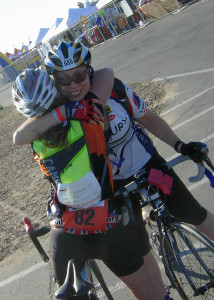 We have all felt that sinking feeling of hopelessness at some point in our lives. I remember as an incredibly shy teenager, I often felt that being hopeful of being asked to the prom or working really hard in hopes of being an “A” student to please my parents went hand-in-hand with feeling naïve, frustrated or foolish when things didn’t work out as planned. Many times I found myself “lowering the Hope bar” if it meant later disappointment.
We have all felt that sinking feeling of hopelessness at some point in our lives. I remember as an incredibly shy teenager, I often felt that being hopeful of being asked to the prom or working really hard in hopes of being an “A” student to please my parents went hand-in-hand with feeling naïve, frustrated or foolish when things didn’t work out as planned. Many times I found myself “lowering the Hope bar” if it meant later disappointment.
As I got older I began to realize that the energy of denying hope simply created more hopelessness. I realized that having hope doesn’t mean living in denial of life’s difficulties; it simply reminds me that it’s a “Gateway to better times ahead.”
Having a healthy dose of hope can be motivating and inspiring. It keeps people focused on what’s ahead instead of what’s in the past. It can also help keep the focus on possibilities, and reframe obstacles as opportunities.
The Benefits of Hope
Research indicates that it’s more beneficial to have hope than not. Hopeful people tend to show more resilience when faced with difficulties. They have healthier lifestyle habits and, on the whole, are more successful, personally and professionally.
According to the Mayo Clinic, having a hopeful, positive attitude has health benefits as well. These include:
- Increased life span
- Reduced depression
- Lowered levels of distress
- Increased resistance to the common cold
- Greater emotional and psychological well-being
- Decreased risk of death from cardiovascular disease
- Improved coping skills during difficulties/stress
In addition, people with hope typically have:
- Meaningful long- and short-term goals
- A plan to achieve those goals
- Flexibility to find alternate ways to achieve goals when faced with obstacles
- Positive self-talk
We humans are sometimes too inventive for our own good—we can envision a future course of action along with every potential catastrophe that could occur along the way. Being aware of everything that can go wrong often makes doing nothing—in an attempt to avoid failure or pain—seem like a viable option.
Cultivating hope, on the other hand, helps activate creativity and inventiveness and prompts us to solve the predicaments we face by taking action in spite of our fears.
Hope brings with it the belief that things can change for the better. Regardless of how dire things may seem, there is potential for a positive outcome.
Is It Possible to Be Too Hopeful?
It could be said that optimists have a healthy dose of hope while “extreme optimists” suffer from blinding hope. They want nothing to do with bad news.
Researchers at Duke University found that extreme optimists (you could call them “high-hopers”) don’t save money, don’t pay off credit cards and don’t make long-term plans, but they are more likely to remarry if divorced.
Moderation, as usual, is the key. The researchers also found that “moderate optimists” tend to:
- Work harder
- Work longer hours
- Make more money
- Save more money
- Pay off credit cards
Being a moderate high-hoper doesn’t mean keeping your head in the sand when it comes to life’s occasional unpleasant circumstances. It just means keeping a positive attitude—believing the best will happen, not the worst.
In other words, whether you expect the best or the worst from life, chances are that’s what you’ll get.
Studies seem to suggest that being hopeful is a skill that can be learned. So whether you’re an extreme optimist, an extreme pessimist or somewhere in between, there is hope for us all.
To learn more you’re invited to my free virtual workshop On The Other Side of Fear Lies Freedom ~Thriving Beyond MS & Other Chronic Illness…click here
“Hope sees the invisible, feels the intangible and achieves the impossible.” —Anonymous
In Gratitude,
Sónia
; ?>/images/soniaSmall.png)
; ?>/images/facebook.png)